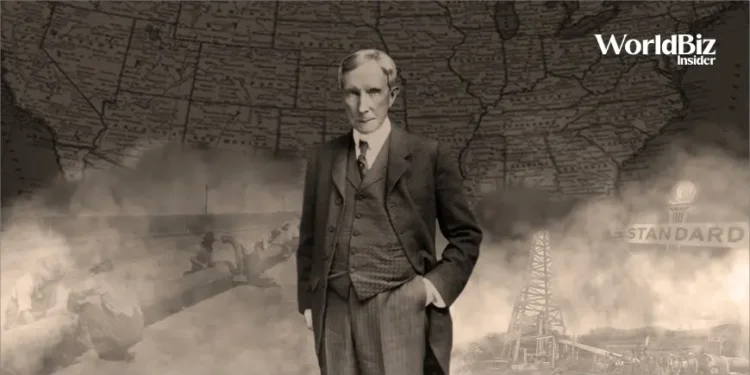John D. Rockefeller is a name synonymous with wealth, power, and philanthropy. As the founder of Standard Oil, Rockefeller became the richest man in history and revolutionized the oil industry. Yet, his journey from humble beginnings to becoming the world’s first billionaire is a remarkable tale of vision, ambition, and strategic business practices. This success story delves into Rockefeller’s rise to power, his business strategies, and his enduring legacy as a pioneer of modern philanthropy.
Humble Beginnings and Early Life
John Davison Rockefeller was born on July 8, 1839, in Richford, New York, into a modest family. His father, William Avery Rockefeller, was a traveling salesman, while his mother, Eliza Davison, was a devout Baptist who instilled in him the values of hard work, discipline, and charity. Growing up in a financially unstable household, Rockefeller learned the importance of frugality and perseverance at a young age.
From an early age, Rockefeller displayed an entrepreneurial spirit. At 12, he began lending small amounts of money to neighbors, charging interest—a practice that foreshadowed his future business acumen. His family later moved to Cleveland, Ohio, where he attended Central High School before enrolling in a business course at Folsom’s Commercial College.
Determined to support his family, Rockefeller started working as a bookkeeper at 16, earning $50 a year. Despite the modest pay, he diligently saved his earnings and developed a keen understanding of financial management, budgeting, and accounting. These foundational skills would later become crucial to his success in business.
First Ventures and Entry into the Oil Industry
In 1859, at the age of 20, Rockefeller partnered with Maurice B. Clark to establish a produce commission business in Cleveland. The venture was profitable, but Rockefeller had his sights set on a more lucrative industry—oil. Around the same time, Edwin Drake drilled the first commercial oil well in Titusville, Pennsylvania, sparking the oil boom.
Recognizing the potential of the oil industry, Rockefeller and Clark invested in an oil refinery in 1863. At that time, oil refining was risky and chaotic, with fluctuating prices and inconsistent quality. However, Rockefeller’s meticulous attention to detail and cost efficiency allowed his refinery to thrive amidst the volatility.
In 1865, Rockefeller bought out Clark’s share for $72,500 and gained full control of the refinery. He then partnered with Samuel Andrews, an experienced chemist, to improve the refining process. Under Rockefeller’s leadership, the refinery produced high-quality kerosene, which became the primary source of lighting in American homes.
Founding of Standard Oil and Business Expansion
In 1870, Rockefeller, along with his brother William and other partners, founded the Standard Oil Company in Ohio. His vision was to bring order to the chaotic oil industry through consolidation and efficiency. Rockefeller pursued vertical integration, controlling every aspect of the business, from production and refining to transportation and marketing.
One of his key strategies was securing favorable shipping rates from railroads through secret rebates, which allowed Standard Oil to transport oil at lower costs than competitors. This cost advantage enabled him to undercut rival refiners, forcing them out of business or into selling their operations to Standard Oil.
Rockefeller’s relentless pursuit of efficiency and economies of scale led to rapid expansion. By 1880, Standard Oil controlled approximately 90% of the U.S. refining capacity, making it the largest and most powerful monopoly in the industry.
Monopoly and Controversy
As Standard Oil grew, it became a target of criticism and controversy. Rockefeller’s aggressive business tactics, including price-cutting, secret deals, and acquisition of competitors, were seen as ruthless and monopolistic. Journalists, most notably Ida Tarbell, exposed Standard Oil’s unfair practices, leading to public outcry and increased scrutiny.
The backlash culminated in a landmark legal battle. In 1911, the U.S. Supreme Court ruled that Standard Oil violated the Sherman Antitrust Act and ordered its breakup into 34 separate companies, including Exxon, Mobil, and Chevron. Ironically, the breakup made Rockefeller even wealthier, as the value of the individual companies surged.
Despite the controversy, Rockefeller defended his practices as necessary for business efficiency and industry stability. He argued that Standard Oil’s consolidation brought consistency in pricing, improved product quality, and reduced waste.
Philosophy and Leadership Style
John D. Rockefeller’s leadership style was marked by discipline, strategic vision, and a focus on long-term growth. He was known for his calm demeanor, patience, and ability to remain composed under pressure. Unlike other industrialists of his time, Rockefeller avoided public attention and maintained a private, modest lifestyle.
Rockefeller believed in rigorous cost control and reinvestment of profits. He constantly sought ways to improve operational efficiency and reduce costs, allowing Standard Oil to maintain competitive pricing. His obsession with data and detailed accounting practices enabled him to make informed business decisions.
A devout Baptist, Rockefeller was guided by strong ethical and moral principles. He viewed wealth as a responsibility and believed in using his fortune for the greater good. This philosophy laid the foundation for his future philanthropic endeavors.
Transition to Philanthropy and Legacy
After retiring from active business in 1897, Rockefeller turned his attention to philanthropy. Inspired by his religious beliefs and the concept of stewardship, he committed to giving away a significant portion of his wealth to improve society. He once stated, “I believe the power to make money is a gift from God, to be developed and used to the best of our ability for the good of mankind.”
In 1913, he established the Rockefeller Foundation, which focused on education, public health, scientific research, and the arts. The foundation played a pivotal role in eradicating diseases like hookworm and yellow fever, advancing medical research, and supporting higher education.
Rockefeller also funded the University of Chicago, transforming it into a world-class educational institution. His contributions to education and public health laid the groundwork for modern philanthropy, inspiring future billionaires to follow in his footsteps.
By the time of his death in 1937, Rockefeller had donated over $500 million to charitable causes, equivalent to billions of dollars today. His legacy as a philanthropist remains as influential as his achievements in business.
Impact and Influence on Modern Business
John D. Rockefeller’s impact on modern business practices is profound. He pioneered the concept of vertical integration, supply chain efficiency, and strategic mergers and acquisitions. His approach to cost control, reinvestment, and consolidation set the standard for large-scale corporate management.
Rockefeller’s success story also shaped U.S. antitrust laws and regulations, influencing how governments handle monopolistic practices. The breakup of Standard Oil became a precedent for future antitrust cases, emphasizing the need for fair competition.
Beyond business, Rockefeller’s philanthropic legacy continues through organizations like the Rockefeller Foundation and Rockefeller University. His approach to systematic giving and strategic philanthropy influenced future benefactors like Andrew Carnegie, Bill Gates, and Warren Buffett.
Conclusion: The Legacy of a Business Titan
John D. Rockefeller’s journey from a struggling bookkeeper to the world’s first billionaire is a story of vision, resilience, and strategic brilliance. He transformed the oil industry, revolutionized business practices, and laid the foundations for modern corporate management. Yet, his influence extends beyond wealth and power—his philanthropic endeavors continue to impact education, health, and scientific research worldwide.
Despite the controversies surrounding his monopolistic practices, Rockefeller’s strategic vision and leadership shaped the American economy and inspired generations of entrepreneurs. His legacy as both a business titan and a pioneer of modern philanthropy remains unmatched.
Rockefeller once said, “Don’t be afraid to give up the good to go for the great.” This philosophy defined his life’s work, driving him to pursue greatness in business and generosity in philanthropy. His story is a timeless reminder that vision, discipline, and a sense of purpose can create a legacy that endures for generations.























